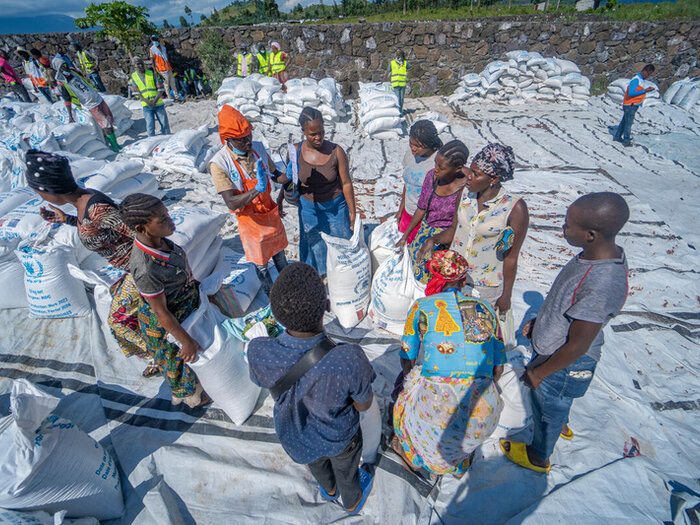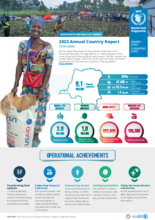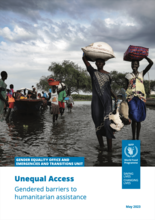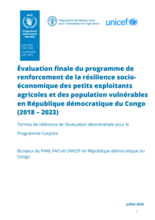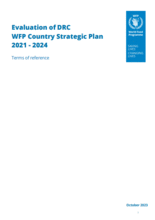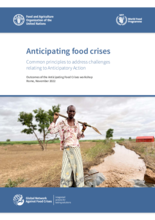Democratic Republic of the Congo
- 23.4 million
- people were acutely food insecure between July–December 2023
- 6.4 million
- people are internally displaced
- 3.9 million
- children and pregnant and breastfeeding women are acutely malnourished
The Democratic Republic of the Congo (DRC) hosts one of the largest hunger crises in the world. Hunger and violence fuel one another, with armed conflict and widespread displacement prevailing for the past 25 years. Multiple other health, weather and economic crises compound humanitarian challenges.
North Kivu, South Kivu and Ituri are provinces where war and unrest have been the most protracted. Countrywide, 6.4 million people have fled their homes and lost their means of livelihood. Since October, 720,000 more people were displaced due to escalating violence across North Kivu.
A total 23.4 million people are projected to be acutely food insecure between January and June 2024, and an estimated 2.8 million children are acutely malnourished.
Around 1 million Congolese nationals are refugees in neighbouring countries. At the same time, DRC – already struggling with internal conflict – hosts over 521,000 refugees and asylum seekers who have fled violence in neighbouring countries, mainly the Central African Republic, Rwanda, Burundi and South Sudan.
What WFP is doing in the Democratic Republic of the Congo
-
Crisis response
-
In 2023, WFP initiated a scale-up to its emergency food and cash assistance in the three conflict-affected provinces of Ituri, North Kivu and South Kivu. WFP can also rapidly respond to urgent immediate food needs in the aftermath of disasters (such as mass displacements and floods), through high-energy biscuit distributions. WFP’s efforts in addressing the hunger crisis are evolving to provide life-saving food assistance while transitioning towards development activities and long-term, food-security initiatives.
-
Resilience in local communities
-
WFP, in partnership with FAO, UNHCR and UNICEF, works with local communities to improve resilience to shocks, promote self-reliance and bring economic recovery. WFP helps smallholder farmers improve production capacities and business processes, which also prepares them for climate-related shocks, through training on climate-smart agricultural techniques. Literacy programmes improve women’s business and income opportunities. Construction and infrastructure rehabilitation projects give local workers an income while maintaining essential food-systems infrastructure.
-
Nutrition
-
WFP runs programmes to both prevent and treat acute malnutrition. At food and cash distribution sites, children under 5 and breastfeeding and pregnant mothers are assessed for signs of malnutrition and are referred to treatment or prevention programmes when necessary. Specialized nutritious foods are distributed regularly at health centres. WFP provides nutritious food to children aged 6 to 23 months, and to pregnant and breastfeeding women, in areas where there is a high prevalence of global acute malnutrition and there are aggravating factors such as high food insecurity, health epidemics and population movement. WFP also runs awareness-raising sessions, including cooking demonstrations, to help families maintain healthy diets and lifestyles.
-
School meals
-
WFP has provided school meals in DRC for over 20 years, in post-conflict and chronically food-insecure areas. Warm meals every school day stave off the risk of malnutrition among vulnerable children. The meals also help keep children in schools, which in turn reduces the risk of child labour and early marriage. School attendance and social mixing also helps to build peace among communities healing from years of hostilities. WFP buys food from local farmer organizations or suppliers, creating a local supply chain and a stable market for farmers.
-
United Nations Humanitarian Air Service (UNHAS)
-
The United Nations Humanitarian Air Service (UNHAS) provides the humanitarian community, donors and diplomatic missions with safe, flexible, efficient and cost-effective air transport to locations across a country the same size as Western Europe. In April 2023, UNHAS introduced a fleet of orange-painted helicopters to distinguish them from others and improve the safety of operations in conflict-affected eastern DRC. Other safety measures include ongoing access negotiations and community engagement.
-
Support to humanitarian coordination
-
As lead of the Logistics Cluster, WFP facilitates an uninterrupted supply of relief assistance across all sectors. WFP also provides transport and storage services for partners. The WFP-led Food Security Cluster ensures partners have access to reliable assessments and studies to inform decision-making. This includes the annual Integrated Food Security Phase Classification Assessment, which provides the humanitarian community with crucial information on food-insecurity levels across the country.
Democratic Republic of the Congo news releases
Go to pagePartners and donors
Find out more about the state of food security in Democratic Republic of the Congo
Visit the food security analysis pageOperations in Democratic Republic of the Congo
Contacts
Office
116, Boulevard du 30 Juin, Immeuble MIBA – Gombe, Kinshasa, the Democratic Republic of the Congo
Kinshasa,
Congo - Kinshasa

